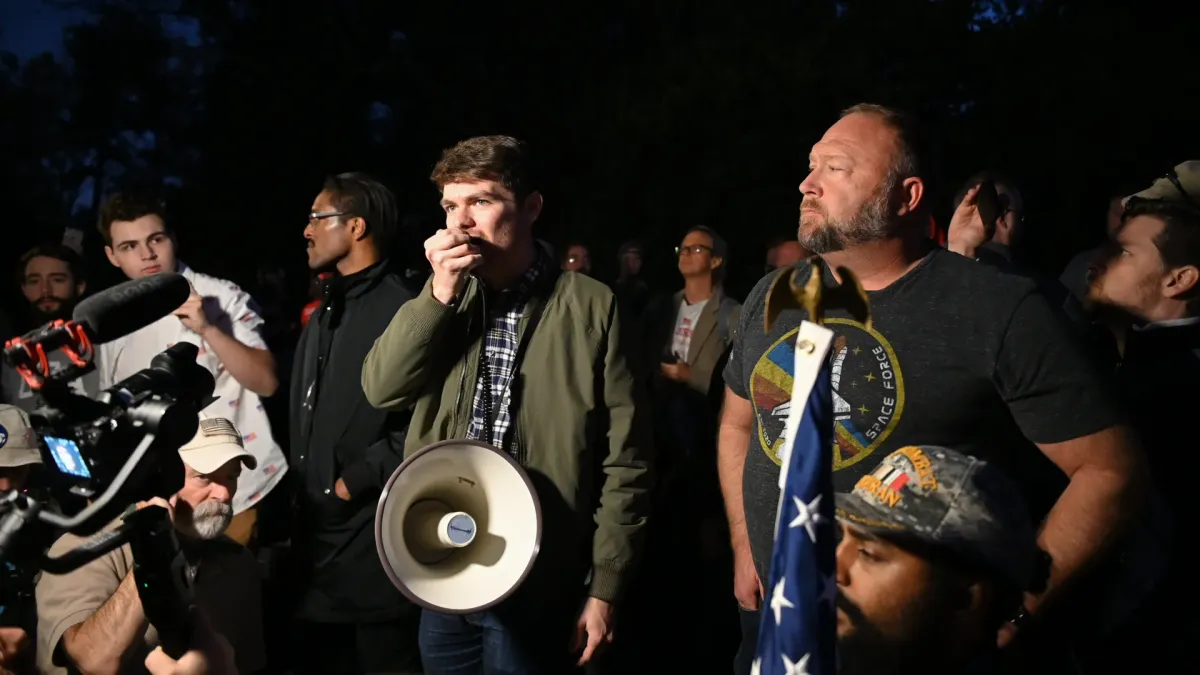Trump’s Selective Antisemitism
Trump’s double game is about dominance, not protection

The Trump administration’s approach to antisemitism isn’t incoherent—it’s instructive. It offers a kind of blueprint for how moral language can be conscripted into the service of power. On one axis, there’s the muscular posture: federal investigations into universities, framed as a defense of Jewish students, carried out with the zeal of a culture war crusade. The messaging is clear, the target unmistakable: elite institutions, academic progressives, campus protest movements.
On the other, we find an eager, breathless urge to embrace allies who espouse virulent antisemitic views—individuals like Nick Fuentes, who dined with Trump at Mar-a-Lago, and Kanye West, the author of the song "Heil Hitler," whose antisemitic outbursts cost him billions, but not Trump's hospitality. What looks like hypocrisy is in fact a form of strategic calibration, in which antisemitism becomes a conditional taboo, enforced not universally but tactically.
This is not new. Antisemitism has always been a malignant force, one of history's oldest and deadliest conspiracy theories. It is not a debating point or a rhetorical lever; it is a toxic ideology that has justified violence, persecution, and ethnic cleansing. Its modern weaponization does not diminish its danger—it compounds it. When leaders tolerate or even court antisemites while claiming to defend Jews, they embolden the very forces that have historically brought horror and bloodshed.
In the Trumpian framework, antisemitism becomes a sorting mechanism. If it emerges (or can be manufactured) from left-aligned campuses, it is a national crisis demanding executive orders and the threat of lost accreditation. If it appears from far-right extremists, it is dismissed, downplayed, or strategically ignored. That is how the charge becomes unmoored from its ethical foundations and repurposed as a weapon.
The administration's Title VI investigations into 60 universities over alleged antisemitism, many of which were not even subject to formal complaints, reflect a growing model of extremism—using the language of minority protection to pursue ideological purification. In this model, Jewish safety is not the goal, but the pretext. And while the bureaucratic veneer remains intact, the underlying motive is deeply corrosive: not to protect Jews from hatred, but to police ideological dissent under the guise of moral righteousness.
There is a reason Columbia, Harvard, and the Ivy League have become central targets. These institutions represent not just elite liberalism, but ideological plurality. By using antisemitism as a Trojan horse to regulate and punish academic spaces, the administration avoids directly targeting leftist speech—it reframes it as a civil rights violation. It is censorship with a civil rights badge.
And yet, this same administration elevated figures who embody a darker strain of American nationalism. Fuentes, a Holocaust denier, was not condemned. He was entertained. Ye, whose comments would get a student expelled or a professor fired, was welcomed at Trump's private club. The message was clear: what matters is not what you say about Jews, but where you stand in the power structure.
This duality is not a bug. It is an intentional configuration. Trump and his strategists understand that antisemitism can be metabolized differently depending on its source. On campuses, it can be linked to criticism of Israel and progressivism. On the right, it can be absorbed into the ecosystem of conspiracy and grievance that animates the MAGA base.
The result is that Jewish identity becomes a proxy battleground for broader ideological warfare. Defenders of Jewish students are deputized as cultural enforcers. Meanwhile, Jewish critics of the administration find themselves caught in an impossible bind: defend liberal institutions and be smeared as antisemitic, or stay silent and cede the narrative.
This is not speculative. It has consequences. When antisemitism is used in this way, its meaning erodes. The term no longer denotes a hatred of Jews; it signals ideological noncompliance. This is the paradox: the more aggressively the term is deployed for political ends, the less power it retains to confront actual danger. And that vacuum allows real antisemitism to flourish, unchallenged, under the cover of weaponized outrage.
Trump's maneuver is not original. It follows a long tradition of authoritarian regimes adopting the language of human rights to undermine them. By presenting himself as the defender of Jews against campus antisemitism, Trump attempts to neutralize criticism of his own alliances with antisemites. It is infamous legerdemain, and it is working. Too many institutions, desperate to avoid scrutiny, have capitulated. Others, more courageous, are forming legal alliances, sharing resources, and resisting.
But the asymmetry persists. As long as antisemitism is defined not by content but by context—not by what is said but by who says it and who it threatens—it will remain a tool of authoritarian drift. The only way to disarm that tool is to reclaim clarity: to name antisemitism wherever it arises, regardless of political convenience. That clarity is dangerous to those who benefit from the paradox. And that, perhaps, is why it must be insisted upon.
There can be no tolerance—none—for Holocaust denial, for Soros conspiracy theories, for the blood libels and coded slanders that fester beneath the surface of nationalist rhetoric. To allow these to pass unchecked, or worse, to elevate their peddlers for short-term political gain, is to trade principle for power and invite the worst of history to repeat itself. There is no strategic gain that can justify the normalization of antisemitism. It must be named. It must be confronted. It must be broken.
The Index is a reader-supported, indie publication.
Now, more than ever, the world needs an independent press that is unencumbered by commercial conflicts and undue influence.
By taking out an optional founding membership, you can help us build a free, accessible, independent news platform firewalled from corporate interests.


